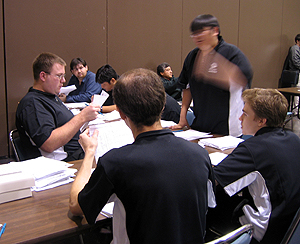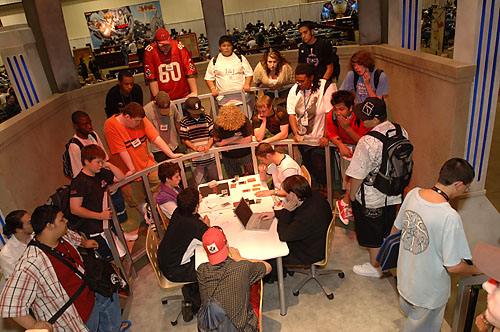
I passed my level 3 rules knowledge test years ago. Eventually they came out with the player management certification, and while I remember thinking, “That’s a great thing to have, to go along with the rules test!” I never actually got around to taking it. I knew it was up, and I kept saying, “Oh yeah, I need to take that one too,” but I kept putting it off. I finally decided to just go ahead and take it (actually I was procrastinating writing last week’s article) and I passed. While I was talking about it afterwards, I heard that next to the level 3 rules knowledge exam, the player management test is the toughest certification test available. I don’t know whether or not that’s actually true, but it started me thinking about why judges might not pass the test. Rulings are easy to study up on and plenty of judges can commit the bulk of them to memory, but some areas of player management require some practical experience and well-developed interpersonal skills that aren’t as easy to acquire.
So today’s article is going to talk about player management, both as its own thing and as a part of the certification process. What better place to begin than by asking, “So what exactly is player management, anyway?”

I’ve found that there are some judges with only the vaguest idea of what “player management” actually is. “Well, it’s . . . managing . . . the players. Right?” Well, yeah, that’s correct in the fundamentals, but somewhat lacking in the details. Player management deals with the administrative part of judging—rulings knowledge is secondary here to knowledge of penalties and tournament policy, as well as your ability to interact face-to-face with the tournament attendees. You could have a level 5 (there actually isn’t a level 5 right now, just so we’re clear) certification in rulings knowledge, but if you don’t have any idea what the tournament policies are, or what penalties are incurred for common infractions, or how to speak to a player to resolve a disagreement, you aren’t going to be a terribly useful judge.
Let’s break “player management” into two discrete segments. First off, there’s knowledge of the tournament policy and penalty guidelines. This is information all judges need to know. You might not memorize it, but you need to be well acquainted with it, and carrying a printed copy isn’t a bad idea either. If judges are failing questions based on these documents, that bodes ill for the events they are judging—players expect (and are entitled to) consistent, appropriate penalties. If you are not familiar with these documents, you will not pass the test—and more importantly, you will not do a good job as a judge.
Penalties/Tournament Policies:
Read these documents. Learn what is in there. Commit the major points to memory. Carry a copy with you when you judge. Talk with other judges—hear what they did in the same situations or go over hypotheticals. Don’t be afraid to ask the opinions of other judges that you respect, especially judges who’ve worked more or bigger events or who are farther along in the program. Judges should always be a resource for one another, and if you’re light on experience in some areas, there’s nothing wrong with benefiting from someone else’s. Finally, remember that the policy documents don’t cover each and every thing that anyone could ever do at a tournament. They aren’t intended to. With a solid knowledge of what’s in there, increasing event experience, and some common sense, a judge should be equipped to make other calls as they arise.
All this practical knowledge is only half of the equation, though. You still need to actually manage those players! That means you’re going to have to talk to them, listen to them, tell them what they need to do, and make sure that they actually do it. It’s not a skill that everyone is born with, so just as you had to do some studying to learn the policy documents, you’re going to have to put in a bit of work to develop your skills in this area. Reading alone isn’t going to teach you all you need to know, however—practical experience is where you really reach your potential in this part of player management.
 Interacting with players:
Interacting with players:
At the event, you are the judge. If you are the head judge, you have final say in matters of policy and rulings, and players are expected to comply with your decisions. However, you do not get to decide who lives and who dies, and certainly neither do the floor judges. There is a line between maintaining discipline and control of an event, and being an autocratic jerk—and if you want to score well in the player management arena (as well as avoid giving judges the world over a bad name) you’ll need to know the difference. A lot of beginning judges err in this regard—they either won’t assert themselves at all, or they go completely overboard in the opposite direction. Judges should not do things like grabbing a microphone to yell at players on the floor, or speak disrespectfully to another judge or players, or refuse to listen to players when giving out a penalty or a ruling.
Authority does not and should not equal “intimidation.” If a judge my size can clear the aisles merely by civilly informing the players they need to move, anyone can. If you’ve begun judging in an area with rowdy or undisciplined players, well, you’ve got your work cut out for you—but you need to be able to run the event by enforcing the rules and being consistent with your penalties. I touched on the differences between a casual and a hard-edged judging style in a previous article; you might find a quick review of that helpful if you’re still trying to strike the right tone at your events.
A judge needs a mature, professional attitude, which he or she should extend towards all attendees. If you have some personal skills that need developing—such as the ability to listen carefully, speak civilly, manage your temper, or deal with disagreement—then you will need to address those areas, because you cannot judge effectively without them. No tournament organizer wants to be represented by a judge who behaves like a troll.

It’s not just players you’ll interact with—you will also have to deal with spectators, parents, media representatives, vendors, security guards, venue staff, etc. You need to be professional and civil to everyone. Don’t assume someone you haven’t seen before is a nobody, unworthy of your time . . . I don’t think your judging career is going to take off if you show up to an event and insult the scorekeeper (who you didn’t recognize because she wasn’t sitting at the computer), or make a disrespectful comment to the PTO’s spouse.
If you haven’t taken the test yet (or need to retake it), focusing on both of these areas will help you make the best choices in your answers. Read the policy document and the penalty guidelines, and pay close attention to what they have to say—don’t let it just trickle through your brain without sticking. Think over situations that you and your fellow judges have dealt with in the past, analyzing how things went. Practical experience will certainly help.
What I really want to stress here, though, is that the little black mark on your judge card showing that you’ve passed level 1 certification shouldn’t be your ultimate goal—the whole point of this is to be better prepared as a judge so you can do the best job possible. We need judges who know more than rulings. We need judges who can properly, professionally, and consistently enforce those rulings, along with policies and penalties. We need judges who can interface with the players and other tournament attendees to keep the event running smoothly and make the tournament experience as positive as possible. Well-trained and prepared judges are a huge asset to Organized Play, and the more of you there are, the better for the program.